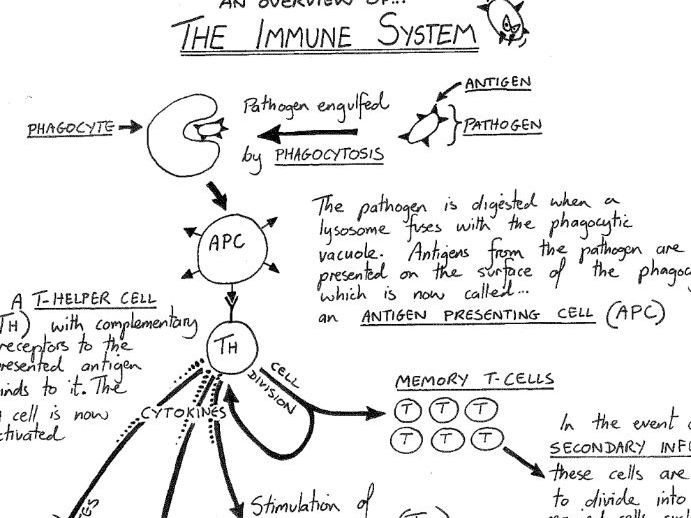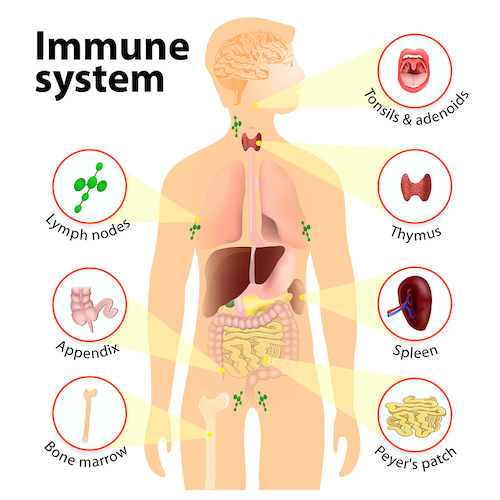5 Immune System Terms Every Student Must Know

Understanding the immune system is essential for every student, whether you're delving into biology, healthcare, or even environmental sciences. The immune system is our body's defense mechanism against pathogens, and it plays a pivotal role in our health and survival. Here, we'll explore five key terms related to the immune system that students should familiarize themselves with. Not only will this knowledge help you in your academic pursuits, but it will also empower you to understand and discuss health-related issues with more depth and clarity.
The Immune System’s Building Blocks: Lymphocytes

Lymphocytes are the type of white blood cells integral to the immune response. They are the central coordinators that lead the immune system’s operations, and they come in different varieties, each with a specific role:
- B Cells: These are responsible for humoral immunity, producing antibodies that neutralize pathogens.
- T Cells: They facilitate cell-mediated immunity, directly attacking infected cells or pathogens. There are several types of T cells including:
- Helper T Cells which manage immune response
- Cytotoxic T Cells which kill infected or damaged cells
🌍 Note: Understanding lymphocytes is crucial because they form the core of the adaptive immune system, allowing for specific responses to pathogens that the body has encountered before.
The Innate Defense: Phagocytosis

The process of phagocytosis is the body’s first line of defense. Phagocytes, like macrophages and neutrophils, engulf and destroy pathogens:
| Phagocytic Cells | Role |
|---|---|
| Macrophages | Reside in tissues to ingest pathogens or dead cells and present antigens to T cells |
| Neutrophils | First responders to bacterial infection, rapidly arriving at infection sites |

🔬 Note: Phagocytosis not only removes pathogens but also aids in the activation of the adaptive immune response by presenting antigens to lymphocytes.
Adaptive Immunity: Antigens and Antibodies

When it comes to targeted defense, antigens and antibodies are crucial:
- Antigens: Foreign substances that elicit an immune response. They can be proteins, polysaccharides, or other molecules from pathogens or allergens.
- Antibodies: Y-shaped proteins produced by B cells that recognize and bind to specific antigens, marking them for destruction or neutralization.
🔬 Note: The interaction between antigens and antibodies is the essence of antibody specificity, which underpins vaccine development and treatments for autoimmune diseases.
Vaccination: Immunological Memory

One of the most significant aspects of our immune system is its ability to remember past invaders. This phenomenon, known as immunological memory, is leveraged by vaccination:
- Vaccines introduce safe versions of pathogens (antigens) to our body.
- The immune system responds and creates memory cells specific to these antigens.
- Upon subsequent exposure to the actual pathogen, these memory cells mount a rapid and effective response, often preventing the disease from taking hold.
🌱 Note: Vaccination is one of the most powerful tools in public health, preventing numerous diseases by harnessing the immune system’s memory.
The Balance: Immunosuppression and Immunodeficiency

While a robust immune system is beneficial, there are situations where the immune response needs to be dampened or is deficient:
- Immunosuppression: This occurs either naturally or through medication to prevent rejection in organ transplants or to treat autoimmune conditions.
- Medications can target specific parts of the immune system to reduce its activity.
- However, this can lead to increased susceptibility to infections.
- Immunodeficiency: Either congenital or acquired (like HIV), this condition impairs the immune system’s ability to fight off infections effectively.
The key points from this discussion highlight the complexity and the vital role of the immune system. Students must grasp that lymphocytes, particularly B and T cells, are fundamental in orchestrating the body’s defense. Phagocytosis serves as the innate response, with macrophages and neutrophils being the primary phagocytic cells. The concept of antigens and antibodies, along with immunological memory, are cornerstones of vaccine strategies and understanding immune tolerance. Finally, the concepts of immunosuppression and immunodeficiency underscore the delicate balance our immune system must maintain.
What is the difference between B cells and T cells?

+
B cells produce antibodies that neutralize pathogens outside of cells, while T cells attack pathogens within cells or help coordinate other immune responses.
How do vaccines work through the immune system?

+
Vaccines introduce harmless pieces of a particular pathogen (antigens) to stimulate the immune system to produce memory cells. These memory cells will recognize and fight off the actual pathogen if encountered in the future.
Why might someone need immunosuppression?

+
Immunosuppression can be necessary in cases where the immune system is overactive, like in autoimmune diseases or to prevent rejection of transplanted organs.